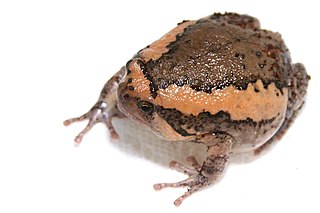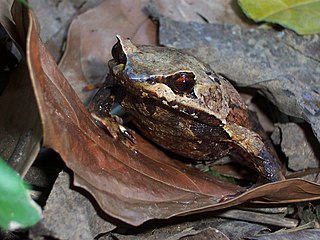
Leptobrachella is a genus of frogs in the family Megophryidae. Members of Leptobrachella are found throughout Asia including on Borneo and the Natuna Islands. They are sometimes referred to as Borneo frogs, slender-armed frogs, or dwarf litter frogs. The genus contains over 80 species with 25 found in China alone.

Eastern spadefoot toads comprise a genus of the family Megophryidae in the order Anura, and are found in southern China, northeast India, southeast Asia, and islands of the Sunda Shelf as well as the Philippines. They are characterized by a stocky body with slender, short hindlimbs. In identifying species, iris colour is a valuable diagnostic morphological characteristic ; the iris has uniform colour in some species, whereas in other species the upper half is coloured and the lower half is dark.

Philautus is a genus of shrub frogs in the family Rhacophoridae from Asia. Some species in this genus are now considered extinct by IUCN, while others are widespread and abundant. The taxonomy of the group is unclear, with many poorly described species.

Rhacophorus is a genus of frogs in the shrub frog family (Rhacophoridae) and the related Hylidae make up the true tree frogs. They are found in India, Japan, Madagascar, Africa, and Southeast Asia. Over 40 species are currently recognised.

Polypedates is a genus of frogs in the family Rhacophoridae, the shrub frogs and Paleotropic tree frogs. They belong to subfamily Rhacophorinae. Members of this genus are collectively known as whipping frogs. They occur in eastern and southern Asia.

Limnonectes is a genus of fork-tongued frogs of about 75 known species, but new ones are still being described occasionally. They are collectively known as fanged frogs because they tend to have unusually large teeth, which are small or absent in other frogs.

Meristogenys is a genus of true frogs from Borneo. Its tadpoles are adapted to fast-flowing mountain streams and easily recognizable by their divided upper lip with ribs on the outside.

Kalophrynus is a genus of microhylid frogs. It is the only genus in the subfamily Kalophryninae. The species in this genus are found in southern China, in Southeast Asia to Java and Philippines, and in Assam, India.

Kaloula is a genus of microhylid frogs found in southern and eastern Asia. They are sometimes known as the Asian narrowmouth toads.

Microhyla, commonly known as the rice frogs or narrow-mouthed frogs, is a genus of frogs in the family Microhylidae. It consists of 42 species of diminutive frogs. Members of this genus are widespread from Ryukyu Is. in Japan, and throughout South-east Asia,.

Megophrys is a genus of frogs in the family Megophryidae. They are endemic to Indonesia, where they are found on the islands of Java and Sumatra. They commonly have elongated upper "eyebrows" and are thus known as Indonesian horned toads. This group was thought to contain many more species and have a much wider distribution prior to recent taxonomic revisions.
The small-headed frog or tiny oriental frog is a species of frog in the family Dicroglossidae. It is endemic to the Philippines where it is found on Mindanao, Basilan, and in the Sulu Archipelago.
Djoko Tjahjono Iskandar is an Indonesian herpetologist who studies the amphibians of Southeast Asia and Australasia. He is a professor of biosystematics and ecology at Bandung Institute of Technology in West Java, Indonesia.

The frog family Dicroglossidae occurs in tropical and subtropical regions of Asia and Africa, with most genera and species being found in Asia. The common name of the family is fork-tongued frogs.

Gracixalus is a genus of shrub frogs from south-eastern Asia.
Limnonectes taylori is a species of frogs in the family Dicroglossidae, first described from Doi Inthanon, Thailand. It occurs in northwestern Thailand and into northern Laos and extreme east-central Myanmar, possibly into adjacent Vietnam. In Thailand, it occurs in the provinces Chiang Mai, Mae Hong Son, Lampang, Nan, and Tak.
Occidozyga tompotika is a species of frog in the family Dicroglossidae. It is endemic to Sulawesi, Indonesia, where it is known from the Balantak Mountains in the Central Sulawesi Province. It is named after Mount Tompotika, its type locality.

Pelobatrachus is a genus of frogs in the family Megophryidae. It was formerly synonymized with Megophrys until 2021, when it was revived as a distinct genus. They inhabit Southeast Asia, namely the Malay Peninsula, Sumatra, Borneo and the Philippines. Their common name is clay horned toads.














